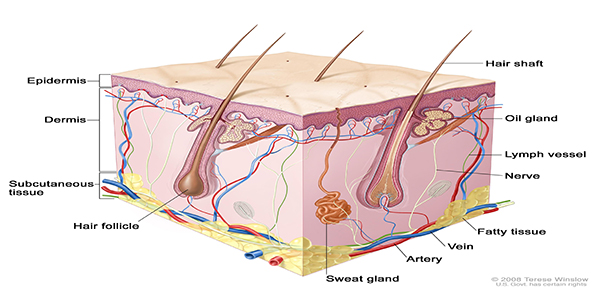Knowledge Articles | All about your skin

All about your skin
Skin can also be considered as separate organ in our body as it has its own unique function of covering the muscles and letting us feel the temperature. It also protects our body from various micro organisms such as virus and bacteria.Skins accounts up to 15% of our body weight. And so, it is the largest organ in our body. If you stretch out your skin, it can be spread up to 20 square feet which almost matches the size of a blanket.
The colour of our skin depends on a pigment called melanin. Our skin would appear darker if we produce more melanin and we may look lighter if our skin produces less melanin. Melanin protects our skin from the ultraviolet rays of the sun.
People near the equator have to face harsh sunlight. Their skin has to produce much melanin in order to cope with the ultra violet rays from such light. This is the reason why some people in the world look darker and some look light.
Do you know that our skin gets renewed in every 28 days! Every minute, our skin sheds more than 30,000 dead skin cells. Thus, an average person sheds around half a kilo of dead cells every year. These dead skin cells form a major part of the dust in our house.
More than 1000 species of bacteria live on our skin. Overall, millions of bacteria reside on the surface of our skin. Some bacteria resides on the dry areas of our skin, some others live on the moist areas and some on the oily surface of the skin. Most of the bacteria is not only harmless but also helps the skin to fight against disease causing microbes.
The skin which is visible to our eyes is called Epidermis. Beneath the Epidermis, there is a thick layer called Dermis which contains hair fossils and sweat glands. The layer beneath the Dermis is called Hypodermis which is made of fat.
Besides protecting our body from microorganisms and acting as a layer... skin has a lot of function that go unnoticed.
- Skin regulates the body temperature through its blood vessels.
- It controls the evaporation of fluids from the body.
- Skin acts as a waterproof so that we don't get soaked!
- It provides Vitamin D to the body by synthesising the Vitamin from the sunlight.